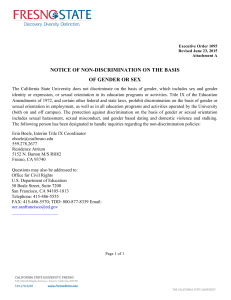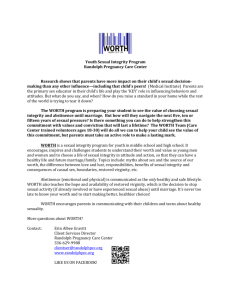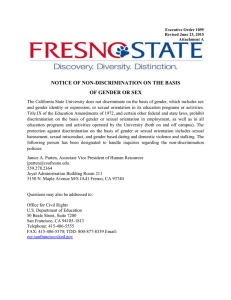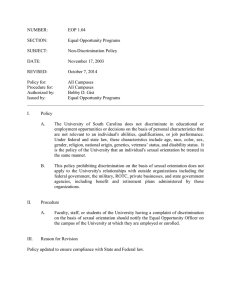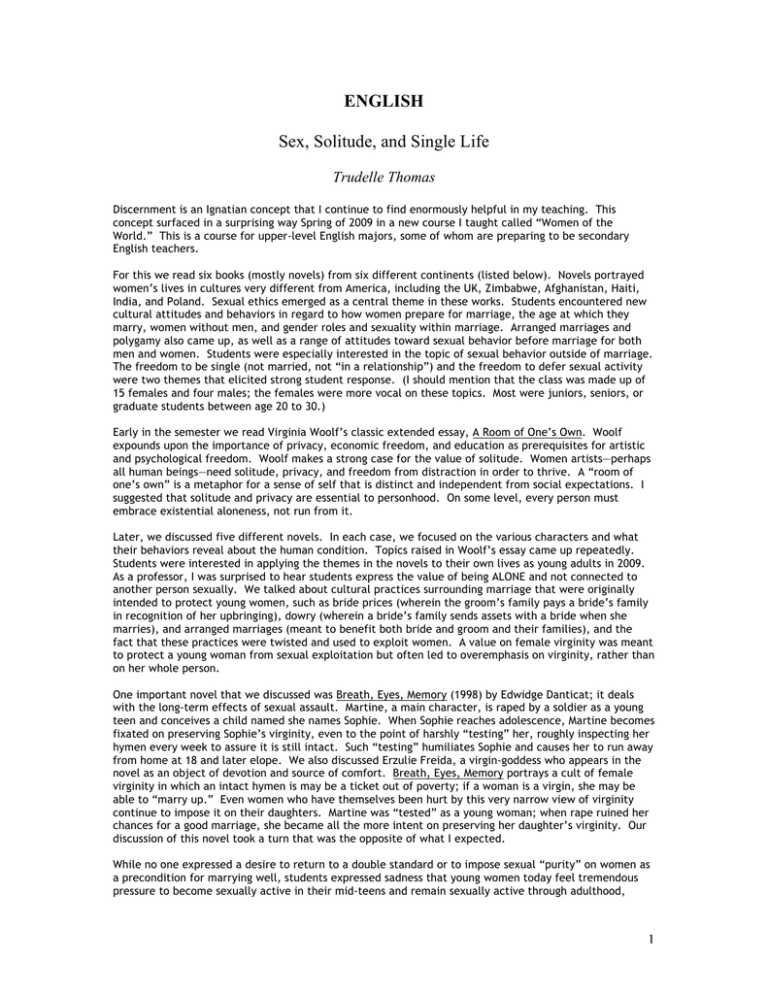
ENGLISH
Sex, Solitude, and Single Life
Trudelle Thomas
Discernment is an Ignatian concept that I continue to find enormously helpful in my teaching. This
concept surfaced in a surprising way Spring of 2009 in a new course I taught called “Women of the
World.” This is a course for upper-level English majors, some of whom are preparing to be secondary
English teachers.
For this we read six books (mostly novels) from six different continents (listed below). Novels portrayed
women’s lives in cultures very different from America, including the UK, Zimbabwe, Afghanistan, Haiti,
India, and Poland. Sexual ethics emerged as a central theme in these works. Students encountered new
cultural attitudes and behaviors in regard to how women prepare for marriage, the age at which they
marry, women without men, and gender roles and sexuality within marriage. Arranged marriages and
polygamy also came up, as well as a range of attitudes toward sexual behavior before marriage for both
men and women. Students were especially interested in the topic of sexual behavior outside of marriage.
The freedom to be single (not married, not “in a relationship”) and the freedom to defer sexual activity
were two themes that elicited strong student response. (I should mention that the class was made up of
15 females and four males; the females were more vocal on these topics. Most were juniors, seniors, or
graduate students between age 20 to 30.)
Early in the semester we read Virginia Woolf’s classic extended essay, A Room of One’s Own. Woolf
expounds upon the importance of privacy, economic freedom, and education as prerequisites for artistic
and psychological freedom. Woolf makes a strong case for the value of solitude. Women artists—perhaps
all human beings—need solitude, privacy, and freedom from distraction in order to thrive. A “room of
one’s own” is a metaphor for a sense of self that is distinct and independent from social expectations. I
suggested that solitude and privacy are essential to personhood. On some level, every person must
embrace existential aloneness, not run from it.
Later, we discussed five different novels. In each case, we focused on the various characters and what
their behaviors reveal about the human condition. Topics raised in Woolf’s essay came up repeatedly.
Students were interested in applying the themes in the novels to their own lives as young adults in 2009.
As a professor, I was surprised to hear students express the value of being ALONE and not connected to
another person sexually. We talked about cultural practices surrounding marriage that were originally
intended to protect young women, such as bride prices (wherein the groom’s family pays a bride’s family
in recognition of her upbringing), dowry (wherein a bride’s family sends assets with a bride when she
marries), and arranged marriages (meant to benefit both bride and groom and their families), and the
fact that these practices were twisted and used to exploit women. A value on female virginity was meant
to protect a young woman from sexual exploitation but often led to overemphasis on virginity, rather than
on her whole person.
One important novel that we discussed was Breath, Eyes, Memory (1998) by Edwidge Danticat; it deals
with the long-term effects of sexual assault. Martine, a main character, is raped by a soldier as a young
teen and conceives a child named she names Sophie. When Sophie reaches adolescence, Martine becomes
fixated on preserving Sophie’s virginity, even to the point of harshly “testing” her, roughly inspecting her
hymen every week to assure it is still intact. Such “testing” humiliates Sophie and causes her to run away
from home at 18 and later elope. We also discussed Erzulie Freida, a virgin-goddess who appears in the
novel as an object of devotion and source of comfort. Breath, Eyes, Memory portrays a cult of female
virginity in which an intact hymen is may be a ticket out of poverty; if a woman is a virgin, she may be
able to “marry up.” Even women who have themselves been hurt by this very narrow view of virginity
continue to impose it on their daughters. Martine was “tested” as a young woman; when rape ruined her
chances for a good marriage, she became all the more intent on preserving her daughter’s virginity. Our
discussion of this novel took a turn that was the opposite of what I expected.
While no one expressed a desire to return to a double standard or to impose sexual “purity” on women as
a precondition for marrying well, students expressed sadness that young women today feel tremendous
pressure to become sexually active in their mid-teens and remain sexually active through adulthood,
1
whether they want to or not. Students reported feeling very strong pressure from the media and peers to
be sexually active—and said that their younger siblings were even more vulnerable to such pressure. By
the college years, it is widely assumed that “virginity” or limited sexual experience is a stigma, for both
women and men. When I asked about the abstinence campaigns in high schools, one student explained,
“We hear lots about abstinence in Catholic high schools but nobody adequately explains the value of
abstinence to the girl herself. We’re just told, ‘Don’t have sex or you’ll get pregnant or get an STD’ or
‘Any sex outside marriage is a sin’ but no one explains how abstinence might benefit her personally.”
Another student seemed to reflect the views of many in the class when she said, “Abstinence is presented
in very ‘all-or-nothing’ terms. It’s assumed that you have should avoid all sexual activity until you’re
married. This is completely unrealistic, so we ridicule the whole idea. But girls still need guidance!”
We noticed that some of the novels included fables or wisdom tales that addressed sexual relationships.
For example, in another novel, ZenZele, a mother (in Zimbabwe) tells her daughter, “You will fall in love
with two different kinds of men—one will make your hands tremble, and another will make your hands
steady. The second one makes a better husband.” Deciding who makes a good lover, who makes a good
husband, and the possible pitfalls of sexual relationships—these issues elicited lively discussion.
As I reflected on our class discussion, I was struck by the huge changes in sexual attitudes that have
occurred in the past fifty years. In their grandmothers’ generation (in the 1950s) women were expected
to remain virgins till marriage or at least engaged. By the late sixties and seventies, many women in their
mothers’ (and my) generation pushed for greater openness around sexuality, more freedom to
experiment, and the elimination of the double standard. This hard-won liberation was intended to free
young women to develop a greater sense of self and wider opportunities. Yet here were many students
saying they lacked the freedom to postpone sexual involvement within a relationship, or to even date
more than one person (without being considered a cheater or slut), or to simply be single and unattached
without being considered a loser. When I recalled discussion about sexual ethics at my own Jesuit
university, I noticed a very strong emphasis on larger issues of social justice (like reducing violence
against women, or eliminating the double standard) but little personal sexual ethics. Anecdotally,
students have often said that no adults talk about sex but some students have sex indiscriminately
(“screw till you’re blue”) often aided by alcohol. This is especially prevalent among first year students.
I should mention that I benefited from discussions on this topic with my mentee, Kelly Austin, a practicing
member of the church of Latter Day Saints (LDS, Mormon) who graduated from Brigham Young University,
where students receive very clear guidance about abstaining from premarital sex. As women of two
different generations and from two different backgrounds (Mormon and United Methodist), we brought
differing attitudes and experiences to this topic.
Such discussions impressed me with the need for more frequent (and OPEN) conversations and guidance
about personal sexual ethics. While it is important to talk about big issues such as sexual assault and
pornography (which have been subjects of public debate on our campus), there also needs to be more
discussion of how to conduct oneself sexually with integrity. I plan to foreground issues of sexual
behavior among the unmarried when I teach this class again, and I think the best way to do this is to focus
on the positive values that come from practicing restraint, and the value of solitude and singlehood to
personal development. Students need to understand that sexual freedom includes the freedom to say no
as well as to say yes. I put together the following handout to give students a framework for thinking
about sexual ethics in a more nuanced way. The freedom to be single and unattached seems especially
valuable for young women who are completing their education and launching their work-lives; intense
relationships too often distract them from their own development. The freedom to postpone sexual
activity and to make considered choices around sexual activity also seems important for women at any
age.
When I teach this course again, I plan to address these issues more directly in an assigned paper. I need
to gain more knowledge in regard to Catholic social teaching around sexuality, as well as the vocation of
“blessed singlehood” (whether for a period of years or a lifetime). But what I plan to make more central
is the practice of DISCERNMENT in potentially sexual relationships: What are the kinds of questions that a
person should consider before becoming emotionally involved? How do you know if a relationship is
enhancing or damaging? What kinds of self-development are important before entering a partnership?
How do these play out in among different sexual subcultures? Drawing on several sources, I offered six
reasons for sexual restraint (see below).
2
I also plan to introduce the idea of choosing single life—avoiding all sexual involvement in order to focus
on personal development, spiritual growth, and service. I will also address how these concerns play out
among both heterosexuals and sexual minorities.
The novel Breath, Eyes, Memory will allow us to explore in greater detail the concepts of sexual “purity”,
integrity, self-determination, and chosen fidelity as alternatives to the cult of virginity. (What metaphors
do these terms imply in regard to sexual activity? Historically, how do they apply to both men and
women?) In addition to a greater emphasis on practicing discernment in relationships, I think students
need guidance around these matters, even if they choose to ignore it. It is important to say that I will not
be didactic, rather offer talking points for discussion. Tradition, Christian scripture, and inherited
wisdom are valuable reference points.
Another good assignment would be to have them write their own “wisdom tales” or to cull wisdom tales
from other cultures and see which ones are relevant to American college students in 2009. Students
already write an oral history in which they interview a woman from a different generation or culture; this
will include a greater emphasis on changing sexual mores.
Works included in this course:
Danticat. Breath, Eyes, Memory. (1998). Haiti.
Whelan. Homeless Bird. (2000). India.
Housseini. A Thousand Splendid Suns. (2007). Afghanistan.
Maraire. ZenZele: A Letter for My Daughter. (1997). Zimbabwe.
Woolf. A Room of One’s Own. UK.
Yolen. Briar Rose. (1992). Poland during Holocaust.
3
ENGL 330 Women of the World: Sexual Integrity
Kerr, Barbara - Smart Girls, Gifted Women. 1987. Has a couple sequels (Smart Girls 2, etc.).
This is a classic work on “gifted” females. Kerr found that young women with some sort of protective
barrier—isolation or homeliness or something that shielded them from dating/men till after they had
developed a strong sense of self and completed their education--were much more likely to realize their
potential as adults. Otherwise, girls identified as gifted simply fall out of the game of educational and
professional advancement.
Grossman, Miriam. Unprotected: A Campus Psychiatrist Reveals How Political Correctness in her
Profession Endangers Every Student. 2006.
Based on her work counseling college women about depression, eating disorders, and sexual trauma, the
author challenges the assumption that women can be involved in casual sex without serious
REPERCUSSIONS. She offers many accounts of how young women lose their way by trying to adapt to
“friends with benefits”. The author suggests that instead of paying attention to their own needs, they
are simply adapting to the perceived needs of college-age boys. She calls for college health centers to
offer guidance on this topic, saying that casual sex is at least as risky as smoking and poor eating habits
and other topics that receive far greater attention.
Shalit, Wendy. A Return to Modesty: Discovering the Lost Virtue. 2000.
A young Jewish writer, trained as a philosopher, argues in favor of reviving modesty. Women who insist
on privacy and control over their own body derive many benefits; she says that modesty-1. Puts women in charge of access to their own bodies. Chastity also implies “completeness in oneself.”
2. Allows women to preserve the beauty of their romantic aspirations ( to be cherished, to find a worthy
partner, to find love that will endure in the face of adversity, to seek an admirable father to her future
children).
3. Compels men to invest themselves in relationships.
4. Enhances the erotic potential of eventual intimacy.
In addition, Kerr and others add:
5. Permits time and mental freedom for women to enjoy schooling, privacy/solitude, friendships
(including cross gender friendship) without being preoccupied with a sexual relationship. How about the
opportunity to date several different people?
6. Greatly improves the likelihood of lifelong mental health. If a person comes into adulthood without a
history of sexual regrets, betrayals, abortions, unexpected pregnancies, STDs, she is far more likely to
have a happy and fulfilled life.
Sexual integrity can go hand-in hand with other virtues or values, such as:
Self-determination – having a say in life choices
Self-development – education, travel, freedom without excessive responsibility.
Sexual integrity - self-possession, including self-discipline—ability to delay gratification.
To think about for an essay
1. Choose particular “cautionary tales” from the works we’ve read that address sexual integrity among
young characters. Is virginity (or fidelity) seen as only a negative “virtue”—i.e., a state of avoiding
something—rather than choosing something? Is any positive value, beyond male honor [in marrying a
virgin and enforcing fidelity on his wife], associated with female chastity? What is gained by restraint?
What metaphors do these terms imply in regard to sexual activity? Historically, do they apply to both
men and women?
2. If you were to teach specific works we’ve covered to high school or middle school students, what more
traditional works would you use as points of comparison? (Romeo and Juliet? Pride and Prejudice?)
3. Discernment implies freedom to make choices. If your generation has new
levels of sexual freedom, what might discernment involve for you? What kinds of questions might you
ask? What, if any, guidance do you need from adults in your life?
4



